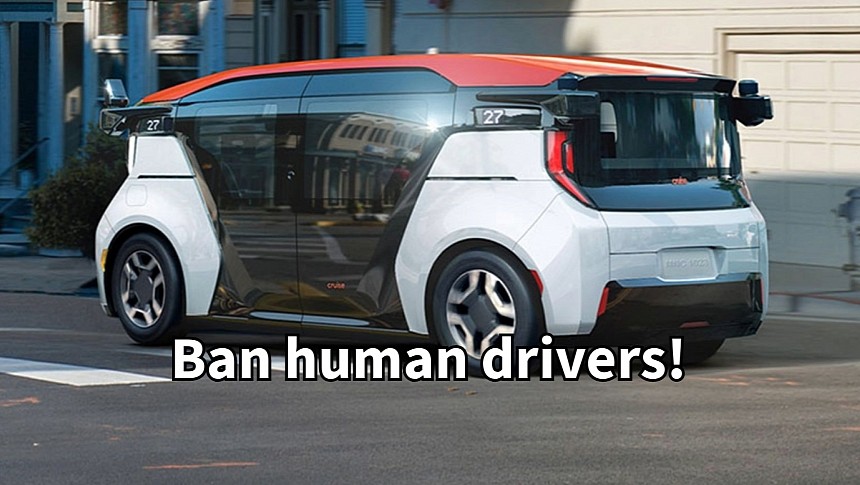driversAutonomous vehicles advance at a fast pace, with Cruise and Waymo at the forefront of this technology. Not everyone is happy, though, as some people in San Francisco want autonomous vehicles banned from the city. Cruise's CEO Kyle Vogt has an even crazier idea: banning human drivers instead.
The world around us is changing fast, and many things we take for granted today will disappear. Take combustion engines, for instance. Although few people believe they will be banned at some point, it's almost certain that they will become as exotic as horses on city streets. Yes, you could see and even drive one on a track, but you won't be able to use it in the city.
The same will probably happen with all cars eventually. Driving one will only be possible in closed, supervised locations as a distraction. You won't be able to drive one on city streets, where autonomous vehicles will reign supreme. Cruise's CEO Kyle Vogt not only believes in this scenario but also says he supports a ban on human drivers in city centers.
This is a wild idea for our times, similar to the "Revenge of the Critters" bubble gum wrappers we had in the 1980s. Only recently, citizens and even local authorities in San Francisco protested against robotaxi companies Cruise and Waymo expanding operations throughout the city. Instead of banning robotaxis, make them the only choice and ban human drivers instead. That's pretty much the idea.
Vogt certainly has the data to support it. Its robotaxis have caused traffic jams, and sometimes even minor crashes in the cities they operate in, but no Cruise AV has ever killed a person. In an earlier study, Cruise showed that its autonomous cars accumulated over one million driverless miles. Compared to human drivers, Cruise AVs were involved in 73% fewer severe collisions with a meaningful risk of injury.
As autonomous driving safety records will improve further, Vogt is optimistic that city residents and community members will one day oppose the presence of human-driven vehicles. This will happen first in urban centers with high pedestrian density. Vogt said Cruise would be honored to join the fight to eliminate human-driven cars from the cities. Still, he doesn't think it will be necessary because city residents will lead the charge once they realize autonomous vehicles are much safer than human drivers.
"If I told you five years from now AVs are gonna be 100 times safer, and you have regions of your city that have high pedestrian and cyclist traffic, it would almost seem reckless as a city planner to allow one version of transportation that's 100 times less safe than the other to coexist in that space," Vogt told TechCrunch at a recent event.
Still, Vogt might be missing the point. Many European cities are removing cars altogether, and safety is only one of the reasons. People in Europe are worried about air pollution produced by human-driven or driverless cars. Even electric vehicles are responsible for particulate matter pollution from brakes, tires, and road dust. Congestion is another reason, as cars need more space to move than bicycles or people walking.
The same will probably happen with all cars eventually. Driving one will only be possible in closed, supervised locations as a distraction. You won't be able to drive one on city streets, where autonomous vehicles will reign supreme. Cruise's CEO Kyle Vogt not only believes in this scenario but also says he supports a ban on human drivers in city centers.
This is a wild idea for our times, similar to the "Revenge of the Critters" bubble gum wrappers we had in the 1980s. Only recently, citizens and even local authorities in San Francisco protested against robotaxi companies Cruise and Waymo expanding operations throughout the city. Instead of banning robotaxis, make them the only choice and ban human drivers instead. That's pretty much the idea.
Vogt certainly has the data to support it. Its robotaxis have caused traffic jams, and sometimes even minor crashes in the cities they operate in, but no Cruise AV has ever killed a person. In an earlier study, Cruise showed that its autonomous cars accumulated over one million driverless miles. Compared to human drivers, Cruise AVs were involved in 73% fewer severe collisions with a meaningful risk of injury.
As autonomous driving safety records will improve further, Vogt is optimistic that city residents and community members will one day oppose the presence of human-driven vehicles. This will happen first in urban centers with high pedestrian density. Vogt said Cruise would be honored to join the fight to eliminate human-driven cars from the cities. Still, he doesn't think it will be necessary because city residents will lead the charge once they realize autonomous vehicles are much safer than human drivers.
"If I told you five years from now AVs are gonna be 100 times safer, and you have regions of your city that have high pedestrian and cyclist traffic, it would almost seem reckless as a city planner to allow one version of transportation that's 100 times less safe than the other to coexist in that space," Vogt told TechCrunch at a recent event.
Still, Vogt might be missing the point. Many European cities are removing cars altogether, and safety is only one of the reasons. People in Europe are worried about air pollution produced by human-driven or driverless cars. Even electric vehicles are responsible for particulate matter pollution from brakes, tires, and road dust. Congestion is another reason, as cars need more space to move than bicycles or people walking.






